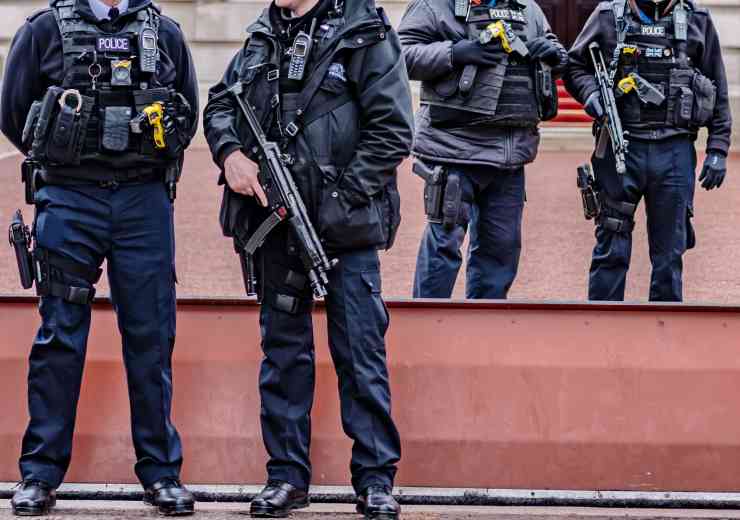Defend, deny, recover – The vital role of the Civil Nuclear constabulary
 In its Strategic Policing Plan 2011-2014 the Civil Nuclear Police Authority has set out its objectives to ensure the counter terrorism force retains its focus in a changing world
In its Strategic Policing Plan 2011-2014 the Civil Nuclear Police Authority has set out its objectives to ensure the counter terrorism force retains its focus in a changing world
The Civil Nuclear Constabulary (CNC) is a specialist armed police service dedicated to the civil nuclear industry and operating under the strategic direction of the Department of Energy and Climate Change (DECC).
The Energy Act received Royal Assent in July 2004 and created a new Civil Nuclear Police Authority to oversee a reconstituted nuclear constabulary evolve from the previous United Kingdom Atomic Energy Authority Constabulary. This Act created the Civil Nuclear Constabulary which was established in April 2005.
Armed police services are required at most civil nuclear sites in the UK and the CNC has units based at 15 sites in England, Scotland and Wales and employs just over 1,000 police officers and staff. The majority of officers in the CNC are authorised firearms officers.
Defend and protect
The CNC’s mission statement is to defend and protect those sites to which it is deployed, with a view to denying unauthorised access to nuclear material and, if necessary, recover control of any nuclear material which may have been lost to any unauthorised persons. It is also committed to the safe and secure movement of nuclear material within the UK and internationally.
In protecting its sites, the CNC works in partnership with the appropriate Home Office or Scottish police force and policing services required at each site are agreed with nuclear operators in accordance with the Nuclear Industries Security Regulations 2003 and ratified by the UK regulator, the Office for Civil Nuclear Security. Security is kept under constant review. Changes to operational tactics are frequent and irregular due to a range of factors and in order to limit the predictability of the police response to any incident.
Mutual support and assistance
The CNC’s focus on counter-terrorist operations is one of the key differences between it and Home Office or Scottish police forces.
The patrol strategy employed by the CNC ensures heightened security at all civil nuclear sites, gives reassurance to the public in the vicinity of those sites, and helps generate local intelligence reports and to constrain and disrupt the operating environment for those with terrorist intent. A further benefit of the patrol strategy has been the deterrence and reduction in minor crime in the vicinity of civil nuclear sites.
Mutual support, assistance and memoranda of understanding with local police forces enable the CNC to maintain focus on its core role. One high profile event where the CNC was able to support its Home Office colleagues was the Derrick Bird shootings where the Constabulary was requested to assist Cumbria Police to help locate the offender.
Since it was established, the CNC has continued to adapt and change. Key developments have included greater interaction with stakeholders and the development of the Operational Police Unit structure, which has enabled better collaboration with Home Office and Scottish police forces. Another key development was the appointment of Richard Thompson as chief constable, who brought a new perspective to the leadership of the CNC.
Programme New Dawn
2008 marked the completion of a wide ranging review of the Constabulary’s capability and capacity which was conducted against the CNC’s Mission Statement and informed by the continuing and uncompromising nature of the terrorist threat.
The review was supported by Her Majesty’s Inspectorate of Constabularies, and identified a number of areas for improvement. A detailed implementation plan designed to address these, together with a new concept of operations that set out the way in which the Constabulary would deliver the operational effect required to mitigate the threat, were presented to and by the Authority.
In February 2009, the Police Authority agreed the funding within to address a number of approved recommendations to uplift and enhance the capability and capacity of the Constabulary in firearms management, training and tactics, and the procurement of equipment, assets and weaponry. This ongoing programme of improvement is called Programme New Dawn.
Richard Thompson, chief constable of the Civil Nuclear Constabulary said: “New Dawn is a three year rolling programme of continuous improvement. This new programme focuses on the wide range of improvements identified in the previous year’s review designed to enhance its capability.
“These, in the main, have flowed from the development of new tactical doctrine that is more appropriate and relevant to our Mission. Upgrading and uplifting the type, quality and frequency of firearms, first aid and Chemical Biological Radiological and Nuclear (CBRN) training, strengthening our command and control systems and deploying improved equipment and ammunition.
“The recruitment of additional firearms instructors has helped the CNC increase training productivity for authorised firearms officers, while the recruitment of force incident managers, who staff the newly-named Command & Control Centre at Culham 24 hours a day, seven days a week, ensures the CNC response to incidents on civil nuclear sites is effective from the point of initiation, has a clear chain of command in which the key decision makers are identified and the importance of early communications between force incident managers, unit control rooms and site emergency controllers is recognised.
“We have also continued to work closely with the wider policing family and have started an international engagement strategy with close allies to help identify and develop best practice in the armed protection of fissile material and civil nuclear facilities.”
The future of the CNC
In its Strategic Policing Plan 2011-2014 the Civil Nuclear Police Authority sets out its aims and objectives to ensure the CNC keeps up-to-date with new counter-terrorist measures and is fully equipped to defend civil nuclear sites.
The specific policing aims set out by the CNC in the plan include increasing operational capability and capacity through the provision of enhanced command and control, preparation for changes in operating geography given current and future decommissioning and new build proposals and working towards the CNC being recognised as a provider of a world class armed response and policing capability for both licensed nuclear sites and for nuclear material in transit.
Richard Thompson continued: “The CNC has successfully protected nuclear material within the UK for over six years. In that time, officers have been deployed for 24 hours a day, 365 days a year and the CNC has grown both in size and resource.
“The successful completion and implementation of the aims outlined in the Policing Plan are essential if the CNC is to continue to provide the nuclear industry, the government and the public with the reassurance that it is truly ‘fit for purpose’ and is in a position to meet its future, as well as its existing, challenges.”
For more information
www.cnc.police.uk















